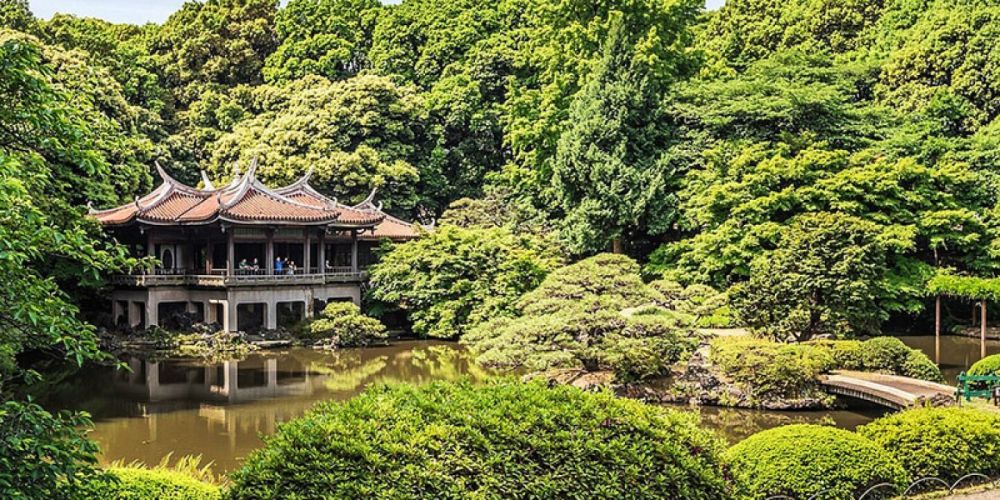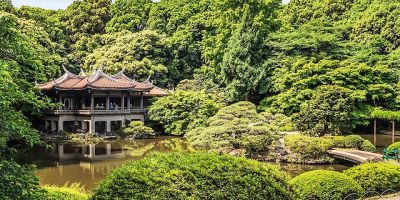

Hanami, which literally means 'flower viewing,' is the Japanese tradition of appreciating the beauty of flowers, especially during the cherry blossom season in spring. Within the expanse of Shinjuku Gyoen National Garden, visitors are treated to a stunning display of cherry blossoms, with several varieties painting a picturesque scene. Tourists and locals alike can spread a blanket under the blossoms, partake in a leisurely picnic, and enjoy the fleeting beauty of sakura. It's an immersive experience that allows you to partake in a centuries-old Japanese custom, while also enjoying a variety of traditional Japanese picnic foods. However, it's important to note that alcohol is not allowed, and visitors are expected to maintain the calm and serene atmosphere of the gardens while being mindful of not damaging the flora.
Shinjuku Gyoen National Garden spans an impressive area, showcasing an array of garden styles, from Japanese traditional to English Landscape and French Formal. A guided walk through these gardens can offer insights into the history, horticultural significance, and aesthetic philosophies behind these different areas. Knowledgeable guides will provide a deeper understanding of the garden's flora, including the art of bonsai cultivation in the Japanese garden, the symmetrical beauty of the French garden, and the sprawling, picturesque nature of the English landscape garden. Visitors can learn about the meticulous care and planning that goes into maintaining such a diverse collection of plants and trees throughout the changing seasons.
Shinjuk? Gyoen becomes a popular viewing spot for k?y?, the autumnal changing of the leaves. The rich tapestry of colors, ranging from deep reds to vibrant yellows, offers a spectacular backdrop for visitors. This activity is especially popular among photographers and nature enthusiasts seeking to capture the essence of a Japanese autumn. The local maples (momiji) trees, along with ginkgos, showcase the fleeting beauty of the fall season. Educational signs posted around the park may offer valuable information about the varieties of trees and the nature of their seasonal changes. Autumn leaves viewing in Shinjuk? Gyoen is also a tranquil moment to reflect and appreciate the quieter beauty of nature as it prepares for winter.
For those interested in tropical and subtropical flora, the greenhouse within Shinjuku Gyoen National Garden is a must-visit. This climate-controlled structure houses a collection of rare and exotic plants that are meticulously cared for. As visitors walk through this indoor garden, they encounter a diverse range of species, including orchids, ferns, and cacti, showcasing various adaptations that help them thrive in their unique environments. The greenhouse is also educational, highlighting the importance of biodiversity and conservation. Visitors can admire the intricate designs of plant structures, inhale the fragrant scents, and enjoy the lush, moist environment that seems worlds away from the bustling city outside the garden walls.
Shinjuku Gyoen National Garden is a photographer's paradise throughout the year, offering a rich tapestry of scenes to capture. Whether it's the blushing cherry blossoms of spring, the vibrant greenery of summer, the fiery hues of autumn leaves, or the serene stillness of a snowy garden in winter, there's always something magical to photograph. The garden presents an excellent opportunity for both amateur and professional photographers to practice landscape, nature, and even portrait photography. With its varied landscapes, Shinjuku Gyoen provides endless inspirations. It’s important to note that while personal photography is welcomed, commercial photography or photoshoots may require permission and potentially additional fees.
Visitors can start their mornings in Shinjuku Gyoen with a peaceful Tai Chi class among the lush greenery of the park. This ancient Chinese martial art, known for its slow and graceful movements, is both meditative and beneficial for health. The classes are often held in the park’s serene settings, which enhances the experience of connecting the mind, body, and nature. While Tai Chi is typically practiced in silence, the gentle sounds of the park's life add a natural rhythm to the movements. Participants of any skill level, from beginners to the more experienced, can join local groups that meet regularly in the park.
Shinjuku Gyoen features a traditional Japanese tea house where visitors can immerse themselves in a centuries-old tea ceremony. This cultural experience is an intimate foray into the world of Japanese customs and hospitality. A tea master guides guests through the ceremonial preparation and presentation of matcha (powdered green tea), which is accompanied by wagashi (traditional Japanese sweets). The ritual of the tea ceremony is a contemplative practice that emphasizes simplicity, harmony, and respect. Surrounded by the tranquil settings of the garden, this activity allows participants to slow down and appreciate the details and flavors of the moment.
With its vast green spaces and variety of trees, Shinjuku Gyoen is a haven for birdwatchers. The garden attracts a number of bird species both residents and migrants that can be observed throughout the year. Seasonal changes bring different species to the foreground, charming bird enthusiasts with opportunities to spot and listen to various songbirds, waterfowl, and raptors. The quieter mornings or late afternoons are particularly ideal for bird watching. Enthusiasts should remember to bring binoculars and a field guide to enjoy this peaceful pursuit fully. The park's diverse ecosystems offer both novices and experienced birdwatchers a rich and rewarding experience.
Artists are drawn to Shinjuku Gyoen's inspiring landscapes and tranquil atmosphere, making it a popular location for sketching, painting, and other forms of artistic expression. With the changing seasons, the park offers a bounty of subjects, from the intricate architecture of the bridges and pavilions to the diverse forms of plant life. Art enthusiasts can take the time to sit and capture the beauty of the surroundings with their preferred medium, be it pencil, watercolor, or oils. The tranquility of the garden fosters a creative and meditative environment for artists to hone their craft and for visitors to create their personal keepsakes from their journey to Shinjuku Gyoen.
Throughout the year, Shinjuku Gyoen hosts a variety of seasonal festivals and events that celebrate Japanese culture and the beauty of the garden's natural environment. These events range from cherry blossom festivals in the spring to autumn leaf festivals in the fall, providing unique and festive experiences for visitors. During these times, the park may feature special exhibitions, performances, and cultural demonstrations that give deeper insight into Japanese traditions and seasonal changes. Guests should check the park's schedule ahead of their visit to plan for these special occasions and enjoy the communal spirit and joy that these festivals bring.
